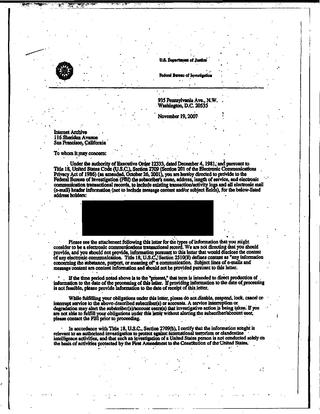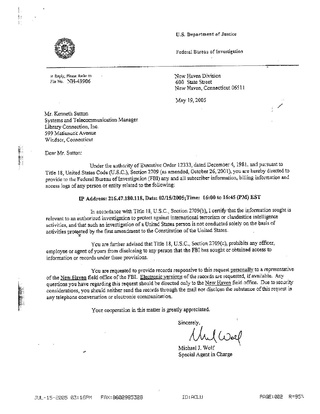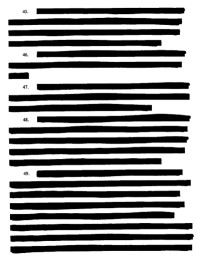
The USA PATRIOT Act was a landmark Act of the United States Congress, signed into law by President George W. Bush. The formal name of the statute is the Uniting and Strengthening America by Providing Appropriate Tools Required to Intercept and Obstruct Terrorism Act of 2001, and the commonly used short name is a contrived acronym that is embedded in the name set forth in the statute.

The Child Online Protection Act (COPA) was a law in the United States of America, passed in 1998 with the declared purpose of restricting access by minors to any material defined as harmful to such minors on the Internet. The law, however, never took effect, as three separate rounds of litigation led to a permanent injunction against the law in 2009.
Brandon Mayfield is a Muslim-American convert in Washington County, Oregon, who was wrongfully detained in connection with the 2004 Madrid train bombings on the basis of a faulty fingerprint match. On May 6, 2004, the FBI arrested Mayfield as a material witness in connection with the Madrid attacks, and held him for two weeks, before releasing him with a public apology following Spanish authorities identifying another suspect. A United States DOJ internal review later acknowledged serious errors in the FBI investigation. Ensuing lawsuits resulted in a $2 million settlement. An initial ruling declared some provisions of the USA PATRIOT Act unconstitutional, but the United States government appealed, and the ruling was overturned at the Ninth Circuit level on technical standing grounds.
A gag order is an order, typically a legal order by a court or government, restricting information or comment from being made public or passed onto any unauthorized third party. The phrase may sometimes be used of a private order by an employer or other institution.
The USA PATRIOT Act was passed by the United States Congress in 2001 as a response to the September 11, 2001 attacks. It has ten titles, each containing numerous sections. Title II: Enhanced Surveillance Procedures granted increased powers of surveillance to various government agencies and bodies. This title has 25 sections, with one of the sections containing a sunset clause which sets an expiration date, December 31, 2005, for most of the title's provisions. This was extended twice: on December 22, 2005 the sunset clause expiration date was extended to February 3, 2006 and on February 2 of the same year it was again extended, this time to March 10.

The following are controversial invocations of the USA PATRIOT Act. The stated purpose of the Act is to "deter and punish terrorist acts in the United States and around the world, to enhance law enforcement investigatory tools, and for other purposes." One criticism of the Act is that "other purposes" often includes the detection and prosecution of non-terrorist alleged future crimes.

NSA warrantless surveillance — also commonly referred to as "warrantless-wiretapping" or "-wiretaps" — was the surveillance of persons within the United States, including U.S. citizens, during the collection of notionally foreign intelligence by the National Security Agency (NSA) as part of the Terrorist Surveillance Program. In late 2001, the NSA was authorized to monitor, without obtaining a FISA warrant, phone calls, Internet activities, text messages and other forms of communication involving any party believed by the NSA to be outside the U.S., even if the other end of the communication lays within the U.S.
Title V: Removing obstacles to investigating terrorism is the fifth of ten titles which comprise the USA PATRIOT Act, an anti-terrorism bill passed in the United States after the September 11, 2001 attacks. It contains 8 sections regarding the capture and prosecution of terrorists.

The following is a section summary of the USA PATRIOT Act, Title II. The USA PATRIOT Act was passed by the United States Congress in 2001 as a response to the September 11, 2001 attacks. Title II: Enhanced Surveillance Procedures gave increased powers of surveillance to various government agencies and bodies. This title has 25 sections, with one of the sections containing a sunset clause which sets an expiration date, of 31 December 2005, for most of the title's provisions. On 22 December 2005, the sunset clause expiration date was extended to 3 February 2006.
The American Bar Association passed resolutions on the USA PATRIOT Act that asked the U.S. Government "to conduct a thorough review of the implementation of the powers granted to the Executive Branch under the Act before considering legislation that would extend or further expand such powers ...." and "to conduct regular and timely oversight including public hearings ... to ensure that government investigations undertaken pursuant to the Foreign Intelligence Surveillance Act ... do not violate the First, Fourth, and Fifth Amendments of the Constitution ...." They also set up a website to discuss issues in relation to the Act, and thus the Patriot Debates were born, where various people debated specific sections.

A national security letter (NSL) is an administrative sb bggggghubpoena issued by the United States government to 6yyytyygggather information for national security purposes. NSLs do not require prior approval from a judge. The Stored Communications Act, Fair Credit Reporting Act, and Right to Financial Privacy Act authorize the United States government to seek such infoggggfgrmation that is "relevant" to authorized national security investigations. By law, NSLs can request only non-content information, for example, transactional records and phone numbers dialed, but never the content of telephone calls or e-mails.

The history of the USA PATRIOT Act involved many parties who opposed and supported the legislation, which was proposed, enacted and signed into law 45 days after the September 11 terrorist attacks in 2001. The USA PATRIOT Act, though approved by large majorities in the U.S. Senate and House of Representative, was controversial, and parts of the law were invalidated or modified by successful legal challenges over constitutional infringements to civil liberties. The Act had several sunset provisions, most reauthorized by the USA PATRIOT Improvement and Reauthorization Act of 2005 and the USA PATRIOT Act Additional Reauthorizing Amendments Act. Both reauthorizations incorporated amendments to the original USA PATRIOT Act, and other federal laws.

John Doe v. Alberto R. Gonzales was a case in which the American Civil Liberties Union (ACLU), Library Connection, and several then-pseudonymous librarians, challenged Section 2709 of the Patriot Act; it was consolidated on appeal with a separate case, Doe v. Ashcroft.
The Electronic Frontier Foundation (EFF) is an international non-profit advocacy and legal organization based in the United States.

The Stored Communications Act is a law that addresses voluntary and compelled disclosure of "stored wire and electronic communications and transactional records" held by third-party Internet service providers (ISPs). It was enacted as Title II of the Electronic Communications Privacy Act of 1986 (ECPA).
A Doe subpoena is a subpoena that seeks the identity of an unknown defendant to a lawsuit. Most jurisdictions permit a plaintiff who does not yet know a defendant's identity to file suit against John Doe and then use the tools of the discovery process to seek the defendant's true name. A Doe subpoena is often served on an online service provider or ISP for the purpose of identifying the author of an anonymous post.

Jameel Jaffer is a human rights and civil liberties attorney and the inaugural director of the Knight First Amendment Institute at Columbia University, which was created to defend the freedoms of speech and the press in the digital age. The Institute engages in "strategic litigation, research, and public education." Among the Knight Institute's first lawsuits was a successful constitutional challenge to President Trump's practice of blocking critics from his Twitter account.

Nicholas Merrill is an American system administrator, computer programmer, and entrepreneur. He is the founder of Calyx Internet Access, an Internet and hosted service provider founded in 1995, and of the non-profit Calyx Institute. He was the first person to file a constitutional challenge against the National Security Letters statute in the USA PATRIOT Act and consequently the first person to have a National Security Letter gag order completely lifted.
The WikiLeaks-related Twitter court orders were United States Department of Justice 2703(d) orders accompanied by gag orders issued to Twitter in relation to ongoing investigations of WikiLeaks issued on 14 December 2010. The U.S. government sent Twitter a subpoena for information about Julian Assange and several other WikiLeaks-related persons, including Chelsea Manning. Twitter appealed against the accompanying gag order in order to be able to disclose its existence to its users, and was ultimately successful in its appeal.
The Connecticut Four are librarians who filed a lawsuit known as Doe v. Gonzales, challenging the constitutional validity of National Security Letters (NSL) issued by the Federal Bureau of Investigation (FBI) under the USA PATRIOT Act.









